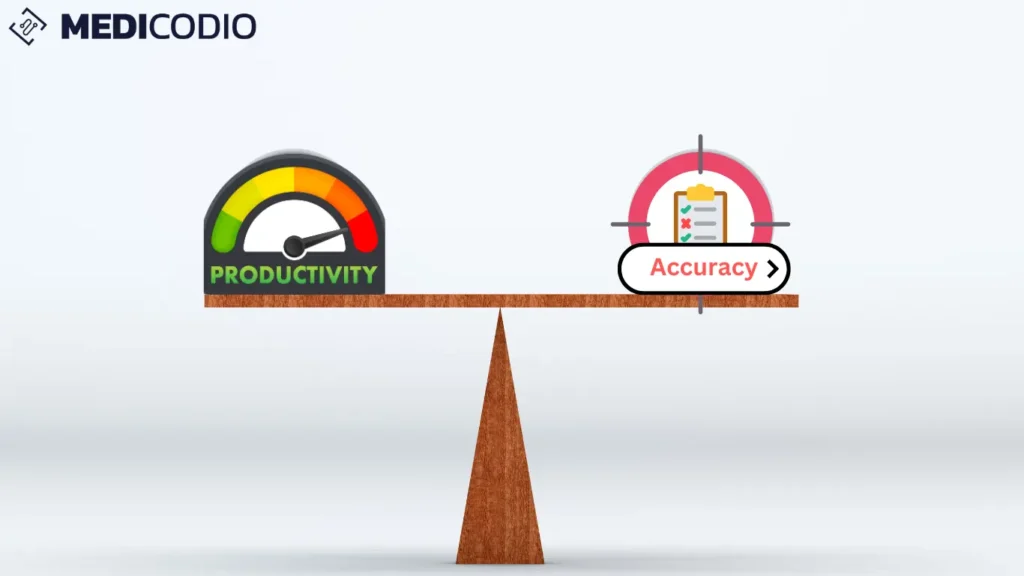In the healthcare world, medical coding is a crucial pillar in ensuring accurate billing and reimbursement. However, achieving a perfect balance between productivity and accuracy can be a constant tightrope walk for coding professionals. On one hand, maximizing efficiency is essential for streamlining workflows and reducing administrative costs. On the other hand, even minor errors in coding can have significant repercussions, leading to denied claims, delayed payments, and even potential legal issues.
This article delves into the current state of medical coding, highlighting the challenges faced by healthcare and RCM (revenue cycle management) billing managers. It also explores how AI medical coding tools can be instrumental in striking a balance between productivity and accuracy, ultimately optimizing the coding process.
The Dilemma: Undercoding and Overcoding:
The financial impact of coding errors is undeniable. In the United States alone, hospitals experience an average loss of $4.9 million annually due to claim denials, a significant portion of which can be attributed to coding inaccuracies.
One of the prevailing challenges in the medical coding realm is the routine occurrence of undercoding. This phenomenon results in unbilled procedures, directly impacting a hospital’s revenue stream. On the flip side, overcoding poses its own set of risks, leading to rejections and the potential for fines. Striking the right balance is critical for financial health and regulatory compliance within the healthcare system.
The Current Landscape:
The current situation in medical coding departments is a complex interplay of human expertise, evolving healthcare regulations, and the sheer volume of data to be processed. Coders, often overburdened with extensive code sets and updates, face the daunting task of accurately translating medical records into codes that adhere to ever-changing billing and reimbursement guidelines. The pressure to process claims quickly can lead to rushed coding decisions, increasing the likelihood of errors.
Medical coding involves a considerable amount of manual data entry and searching through extensive coding manuals, which can be tedious and time-consuming, potentially leading to fatigue and decreased focus.
The impact of coding errors is multifaceted. Apart from financial implications, these errors can lead to delayed or denied claims, hampering the cash flow of healthcare institutions. Moreover, undercoding not only results in revenue loss but also skews data analysis, hindering the ability to make informed decisions based on accurate information.

The Role of AI Medical Coding:
To navigate these challenges and achieve the delicate equilibrium between productivity and accuracy, healthcare and revenue cycle management (RCM) managers are increasingly turning to artificial intelligence (AI) tools.
AI in medical coding involves the use of advanced algorithms and machine learning to streamline and enhance the accuracy of the coding process. These tools can efficiently analyze vast amounts of healthcare data, ensuring that codes are assigned correctly, and potential errors are flagged before they become costly mistakes.
Benefits of AI Medical Coding:
AI medical coding software offers several benefits, which include:
-
- Increased Productivity: AI tools can process and analyze medical records at a much faster rate than human coders, significantly boosting productivity without compromising accuracy.
- Error Reduction: AI algorithms can catch coding errors in real-time, preventing costly mistakes before claims are submitted. This proactive approach minimizes denials and accelerates revenue cycle management.
- Adaptability to Regulatory Changes: With healthcare regulations constantly evolving, AI tools can adapt quickly to changes, ensuring that coding practices remain compliant with the latest guidelines.
- Data-Driven Insights: AI-driven analytics provide healthcare and RCM managers with valuable insights into coding patterns, helping them make informed decisions to optimize revenue and improve operational efficiency.
Conclusion:
In the ever-evolving landscape of healthcare, striking the right balance between increasing medical coding productivity and reducing errors is paramount.
As healthcare and RCM managers grapple with the challenges in the coding department, the integration of AI tools emerges as a strategic solution. By harnessing the power of artificial intelligence, healthcare institutions can not only enhance productivity but also fortify themselves against the financial pitfalls associated with coding errors. As the healthcare industry continues to advance, the judicious use of AI in medical coding stands as a beacon of efficiency and accuracy in the pursuit of optimal patient care and financial sustainability.
Use Artificial Intelligence Tool to Manage Your Medical Coding
If you want ways to improve the efficiency and outcomes of your revenue cycle management (RCM) processes, one option is to use artificial intelligence (AI). AI has many uses in healthcare RCM, from enhancing coding accuracy to optimizing end-to-end RCM workflow.
Contact MediCodio to optimize your medical coding process using the latest AI technologies. With our expertise, we can help you improve your medical coding process and achieve better care coordination, reduce costs, and enhance reimbursement.
If you want to try CODIO, our AI Medical Coding tool, please schedule a demo here!





